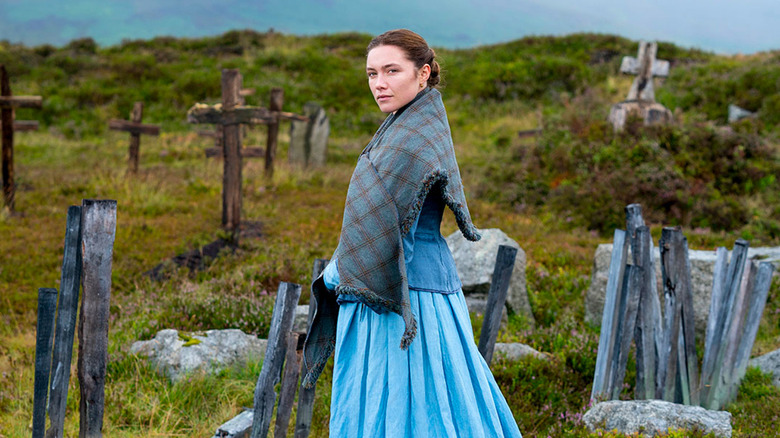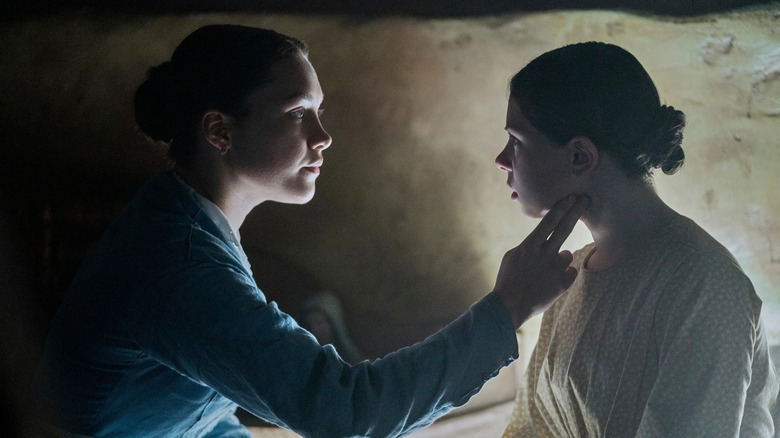The Wonder Review: Florence Pugh Investigates A Miracle In This Chilly Oddity [TIFF]
The camera glides across a soundstage, showing the rough exterior of the set of a house built on top of a steel platform. "This is the beginning of a movie called 'The Wonder,'" a narrator tells us, before adding: "We are nothing without stories." Eventually, the camera pans over to a small set dressed to resemble the bowels of a ship, where a woman (Florence Pugh) sits, eating from a bowl, as the set rocks back and forth to mimic the rolling of the waves.
It's a provocative intro, but ... why is it happening? After this setup, director Sebastián Lelio's "The Wonder" completely abandons the "this is all a movie on a set" idea, and fully commits itself to being set in the Irish countryside in 1862, complete with lush, on-location shooting. What is Lelio trying to say with that facade-based intro? That what we're seeing is all a lie? That reality is often hidden from us? I confess I do not know, and I found this utterly perplexing, especially since the film doesn't bother to return to this framing device until its final moments.
Once "The Wonder" moves beyond this opening, it turns into an eerie psychological drama about faith vs. science and love vs. mercy. Pugh's character is a nurse named Lib Wright, and she's been summoned from England to Ireland to investigate an alleged miracle. A young girl named Anna (a whispy, whispery Kíla Lord Cassidy) has supposedly not eaten anything for four months — an impossibility underlined by the fact that Anna seems perfectly fine and healthy. The medical-minded Lib doesn't buy this at all, but she agrees to work for a local council of scowling men in order to get to the bottom of the mystery.
Her job is to simply sit and watch and confirm whether or not Anna is really eating. The men of the council are split on what's going on here — some think this is a flat-out miracle, although even a local priest (Ciarán Hinds, in a weirdly small role) has his doubts. The local doctor (Toby Jones) doesn't buy the holy miracle angle, but he does think what's happening to Anna could be a medical miracle. And so Lib pays daily visits to the cottage where Anna lives with her family, watching, waiting, and doubting.
A strange ritual
At this point it's firmly established that Florence Pugh is very, very good at what she does, so it should come as no surprise that she's the best part of "The Wonder." A layered, introspective, angry performance, Pugh's Lib grows frustrated with what she considers the backwards ways of Anna's family and neighbors. They're deeply religious, and thus have no problem accepting that Anna's ability to stay alive after not eating for months is a miracle. Lib has dark, tragic secrets of her own, and they haunt and torment her. At night, she drinks laudanum and pricks her own finger in some sort of strange ritual. By day, she remains chilly and distant, even to Anna — although she eventually thaws and befriends the girl.
As for Anna, she continually claims she's telling the truth. When asked if she's eaten anything, her reply is that all she's had is "manna from heaven." Meanwhile, a suspicious journalist named William (Tom Burke) has shown up to cover Anna's story. Lib resists him, too — until she comes around to accepting him as her sole confidant in the matter. But William grew up in these parts, and despite his skepticism, he understands the locals more than Lib.
"The Wonder" is suitably haunting, with a color palette, rich in blue-greens, giving the entire film, with its abundant rustic wooden buildings, the appearance of being set on a shipwreck beneath the sea. Meanwhile, Matthew Herbert's jarring, clanging, whisper-based score creates an off-kilter atmosphere; one that summons up a terrible feeling in the pit of your stomach. It's all effectively rendered and believable, and Ari Wegner's wide, encompassing cinematography is postcard-perfect — there's one particular wide shot of a burning house framed against a wide open sky with a low-hanging moon that stunned me.
But "The Wonder" is too light for its own good — there's not much story here, and the film begins to feel rather repetitive. It also can't seem to make up its mind as to what it wants to be. There are plenty of horror-like elements — Anna begins to get sick, complete with a bloody tooth being pulled from her mouth — but it's not very scary. And all that talk of storytelling doesn't pan out. But I was still hypnotized by it all; wrapped up in the strangeness mixed with the beautiful-but-lonely countryside. By the time the credits rolled, I was chilled, but puzzled. What does it all mean? Perhaps, like Lib, I am unable to comprehend the religious zealotry that has gripped the land. Or perhaps "The Wonder" doesn't have very much to say.
/Film Rating: 6 out of 10

